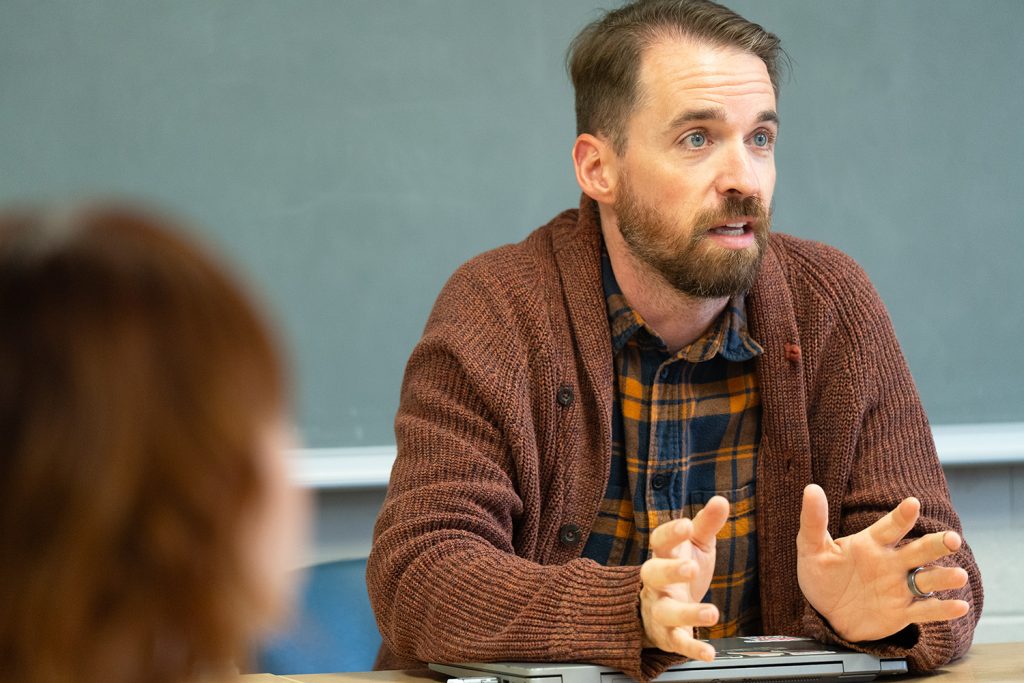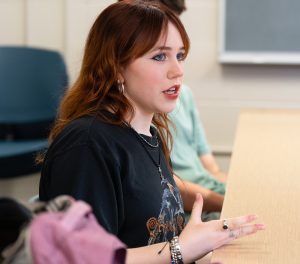
Story by Tanner O’Neal Riley
Photos by Logan Jackson
When one thinks of an Honors College class, what most often comes to mind? History, theology, anthropology and perhaps sociology, to name a few. What one doesn’t think of? Harry Potter fan rivalries, the rise and fall of Beanie Baby mania or the new-fangled cultural icon bringing the most stoic of men to their knees, the Labubu. That’s exactly what Doug Valentine’s one-credit Honors Tutorial on fandom, offered through the Mizzou Honors College, seeks to explore. In his course, Fandoms: Gamers, Football, and K-Pop, Oh My!, he invites students to break down the culture and community that surrounds pop culture, from video games to comic books and more.
Valentine, an assistant teaching professor of sociology in the Honors College, said, “The course isn’t about judging what people like but understanding why they like it. Fandom is a way of creating identity and building community, a sense of belonging and boundary-making. By studying it, students can see how popular culture shapes the way we connect with one another.”
The course meets once a week and blends short readings with open discussion. Valentine said his goal is to get students to think critically about subjects they normally consume for entertainment. One week might look at the explosion of Marvel’s cinematic universe and how fans’ theories spread across Reddit and TikTok. Another might explore Taylor Swift’s fan base, examining how “Swifties” use social media to organize everything from concert meetups to charitable campaigns.
One could argue that this sounds like a sociology course, but there’s a reason for the name and the subject matter. “I could have called this course ‘Social Identities in the 21st Century,’ but that doesn’t have the same hook,” Valentine said. “Fandom gives us a way in — it’s something students already care about, which means they engage more deeply with the theory.”

For students like Helton Walker, a sophomore journalism student studying strategic communication, the appeal of the class was immediate. “I honestly can’t remember a time when I haven’t been a fan of something,” Walker said. “I think fandoms are an essential part of my identity and interests, and have shaped me into the creative, open-minded person I am today.”
Walker first heard about the class while bonding with her freshman-year resident assistant (RA) over shared “fangirl” moments. “I figured there wouldn’t likely be many other opportunities in college to take a class that lets me academically analyze a topic so close to my heart, like fandoms and fan culture,” she said.
This isn’t Walker’s first class with Valentine. Previously, she took The American Way of Death, which examined themes of mourning and mortality from multiple disciplines. The Honors Fandom Tutorial, Walker said, has a similar interdisciplinary spirit. “Our class is made up of individuals from different backgrounds — engineering, journalism, history, communication — who lead class discussions on different fandoms and social-science topics.”
Ultimately, Walker said the course has reshaped how she sees her own fan identity. “Even in my limited time in this course, my view of my own fandoms and pop culture in general has changed significantly. This course has reaffirmed to me both the prevalence and significance of fandom culture in society, as well as the many ways fandoms can evolve into even better safe spaces for individuals to feel included, accepted and empowered in their identities as fans.”
“That’s the goal,” Valentine added. “I don’t want students to leave the course just knowing more about KPop Demon Hunters or Marvel. I want them to leave with sharper critical thinking skills — asking, ‘Why do people behave the way they do in groups? What does culture do to us, and what do we do with culture?’
“Fandoms may seem lighthearted on the surface, but they reveal how people find belonging, how they express creativity and how culture spreads. Those are powerful forces worth studying.”